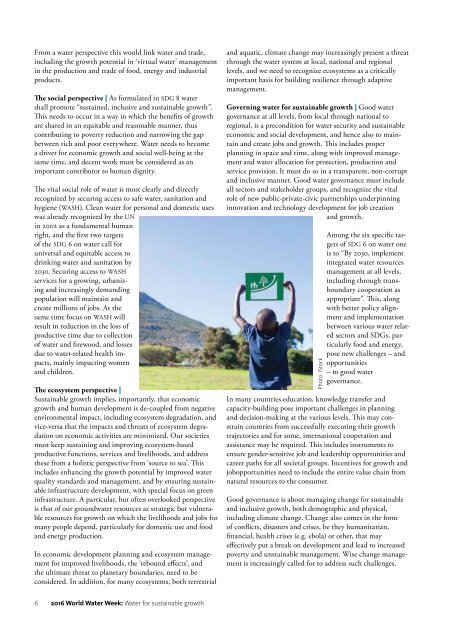2016 World Water Week programme
Create successful ePaper yourself
Turn your PDF publications into a flip-book with our unique Google optimized e-Paper software.
From a water perspective this would link water and trade,<br />
including the growth potential in ‘virtual water’ management<br />
in the production and trade of food, energy and industrial<br />
products.<br />
The social perspective | As formulated in SDG 8 water<br />
shall promote “sustained, inclusive and sustainable growth”.<br />
This needs to occur in a way in which the benefits of growth<br />
are shared in an equitable and reasonable manner, thus<br />
contributing to poverty reduction and narrowing the gap<br />
between rich and poor everywhere. <strong>Water</strong> needs to become<br />
a driver for economic growth and social well-being at the<br />
same time, and decent work must be considered as an<br />
important contributor to human dignity.<br />
The vital social role of water is most clearly and directly<br />
recognized by securing access to safe water, sanitation and<br />
hygiene (WASH). Clean water for personal and domestic uses<br />
was already recognized by the UN<br />
in 2002 as a fundamental human<br />
right, and the first two targets<br />
of the SDG 6 on water call for<br />
universal and equitable access to<br />
drinking water and sanitation by<br />
2030. Securing access to WASH<br />
services for a growing, urbanizing<br />
and increasingly demanding<br />
population will maintain and<br />
create millions of jobs. At the<br />
same time focus on WASH will<br />
result in reduction in the loss of<br />
productive time due to collection<br />
of water and firewood, and losses<br />
due to water-related health impacts,<br />
mainly impacting women<br />
and children.<br />
The ecosystem perspective |<br />
Sustainable growth implies, importantly, that economic<br />
growth and human development is de-coupled from negative<br />
environmental impact, including ecosystem degradation, and<br />
vice-versa that the impacts and threats of ecosystem degradation<br />
on economic activities are minimized. Our societies<br />
must keep sustaining and improving ecosystem-based<br />
productive functions, services and livelihoods, and address<br />
these from a holistic perspective from ‘source to sea’. This<br />
includes enhancing the growth potential by improved water<br />
quality standards and management, and by ensuring sustainable<br />
infrastructure development, with special focus on green<br />
infrastructure. A particular, but often overlooked perspective<br />
is that of our groundwater resources as strategic but vulnerable<br />
resources for growth on which the livelihoods and jobs for<br />
many people depend, particularly for domestic use and food<br />
and energy production.<br />
In economic development planning and ecosystem management<br />
for improved livelihoods, the ‘rebound effects’, and<br />
the ultimate threat to planetary boundaries, need to be<br />
considered. In addition, for many ecosystems, both terrestrial<br />
and aquatic, climate change may increasingly present a threat<br />
through the water system at local, national and regional<br />
levels, and we need to recognize ecosystems as a critically<br />
important basis for building resilience through adaptive<br />
management.<br />
Governing water for sustainable growth | Good water<br />
governance at all levels, from local through national to<br />
regional, is a precondition for water security and sustainable<br />
economic and social development, and hence also to maintain<br />
and create jobs and growth. This includes proper<br />
planning in space and time, along with improved management<br />
and water allocation for protection, production and<br />
service provision. It must do so in a transparent, non-corrupt<br />
and inclusive manner. Good water governance must include<br />
all sectors and stakeholder groups, and recognize the vital<br />
role of new public-private-civic partnerships underpinning<br />
innovation and technology development for job creation<br />
and growth.<br />
Photo: iStock<br />
Among the six specific targets<br />
of SDG 6 on water one<br />
is to “By 2030, implement<br />
integrated water resources<br />
management at all levels,<br />
including through transboundary<br />
cooperation as<br />
appropriate”. This, along<br />
with better policy alignment<br />
and implementation<br />
between various water related<br />
sectors and SDGs, particularly<br />
food and energy,<br />
pose new challenges – and<br />
opportunities<br />
– to good water<br />
governance.<br />
In many countries education, knowledge transfer and<br />
capacity-building pose important challenges in planning<br />
and decision-making at the various levels. This may constrain<br />
countries from successfully executing their growth<br />
trajectories and for some, international cooperation and<br />
assistance may be required. This includes instruments to<br />
ensure gender-sensitive job and leadership opportunities and<br />
career paths for all societal groups. Incentives for growth and<br />
jobopportunities need to include the entire value chain from<br />
natural resources to the consumer.<br />
Good governance is about managing change for sustainable<br />
and inclusive growth, both demographic and physical,<br />
including climate change. Change also comes in the form<br />
of conflicts, disasters and crises, be they humanitarian,<br />
financial, health crises (e.g. ebola) or other, that may<br />
effectively put a break on development and lead to increased<br />
poverty and unstainable management. Wise change management<br />
is increasingly called for to address such challenges.<br />
6 <strong>2016</strong> <strong>World</strong> <strong>Water</strong> <strong>Week</strong>: <strong>Water</strong> for sustainable growth


















